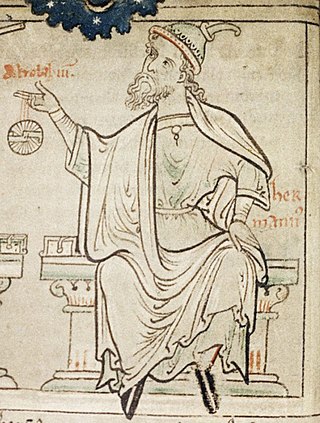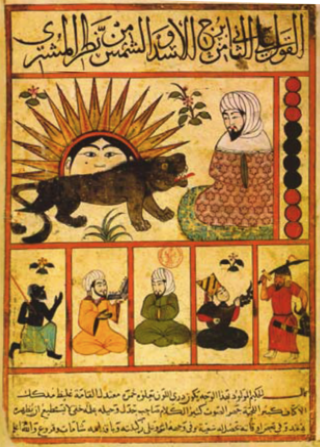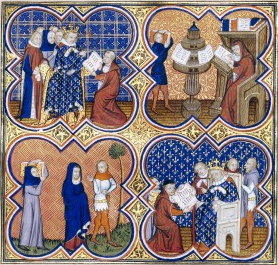Related Research Articles
Robert of Ketton, known in Latin as Rodbertus Ketenensis, was an English astronomer, translator, priest and diplomat active in Spain. He translated several works of Arabic into Latin, including the first translation of the Quran into any Western language. Between 1144 and 1157 he held an archdeaconry in the diocese of Pamplona. In the past he has been confounded with Robert of Chester, another English translator active in Spain in the mid-twelfth century; and at least one modern scholar believes they are the same person.

Adelard of Bath was a 12th-century English natural philosopher. He is known both for his original works and for translating many important Greek scientific works of astrology, astronomy, philosophy, alchemy and mathematics into Latin from Arabic versions, which were then introduced to Western Europe. The oldest surviving Latin translation of Euclid's Elements is a 12th-century translation by Adelard from an Arabic version. He is known as one of the first to introduce the Arabic numeral system to Europe. He stands at the convergence of three intellectual schools: the traditional learning of French schools, the Greek culture of Southern Italy, and the Arabic science of the East.
Bartholomaeus Anglicus, also known as Bartholomew the Englishman and Berthelet, was an early 13th-century Scholastic of Paris, a member of the Franciscan order. He was the author of the compendium De proprietatibus rerum, dated c.1240, an early forerunner of the encyclopedia and a widely cited book in the Middle Ages. Bartholomew also held senior positions within the church and was appointed Bishop of Łuków in what is now Poland, although he was not consecrated to that position.

Herman of Carinthia, also called Hermanus Dalmata or Sclavus Dalmata, Secundus, by his own words born in the "heart of Istria", was a philosopher, astronomer, astrologer, mathematician and translator of Arabic works into Latin.

Gerard of Cremona was an Italian translator of scientific books from Arabic into Latin. He worked in Toledo, Kingdom of Castile and obtained the Arabic books in the libraries at Toledo. Some of the books had been originally written in Greek and, although well known in Byzantine Constantinople and Greece at the time, were unavailable in Greek or Latin in Western Europe. Gerard of Cremona is the most important translator among the Toledo School of Translators who invigorated Western medieval Europe in the twelfth century by transmitting the Arabs' and ancient Greeks' knowledge in astronomy, medicine and other sciences, by making the knowledge available in Latin. One of Gerard's most famous translations is of Ptolemy's Almagest from Arabic texts found in Toledo.
William of Moerbeke, O.P., was a prolific medieval translator of philosophical, medical, and scientific texts from Greek into Latin, enabled by the period of Latin rule of the Byzantine Empire. His translations were influential in his day, when few competing translations were available, and are still respected by modern scholars.

Johannes de Sacrobosco, also written Ioannes de Sacro Bosco, later called John of Holywood or John of Holybush, was a scholar, monk, and astronomer who taught at the University of Paris.

Abu Ma‘shar al-Balkhi, Latinized as Albumasar, was an early Persian Muslim astrologer, thought to be the greatest astrologer of the Abbasid court in Baghdad. While he was not a major innovator, his practical manuals for training astrologers profoundly influenced Muslim intellectual history and, through translations, that of western Europe and Byzantium.

The Complutensian Polyglot Bible is the name given to the first printed polyglot of the entire Bible. The edition was initiated and financed by Cardinal Francisco Jiménez de Cisneros (1436–1517) and published by Complutense University in Alcalá de Henares, Spain. It includes the first printed editions of the Greek New Testament, the complete Septuagint, and the Targum Onkelos. Of the 600 six-volume sets which were printed, only 123 are known to have survived to date.

Plato Tiburtinus was a 12th-century Italian mathematician, astronomer and translator who lived in Barcelona from 1116 to 1138. He is best known for translating Hebrew and Arabic documents into Latin, and was apparently the first to translate information on the astrolabe from Arabic.
Robert of Chester was an English Arabist of the 12th century. He translated several historically important books from Arabic to Latin, such as:

Latin translations of the 12th century were spurred by a major search by European scholars for new learning unavailable in western Europe at the time; their search led them to areas of southern Europe, particularly in central Spain and Sicily, which recently had come under Christian rule following their reconquest in the late 11th century. These areas had been under Muslim rule for a considerable time, and still had substantial Arabic-speaking populations to support their search. The combination of this accumulated knowledge and the substantial numbers of Arabic-speaking scholars there made these areas intellectually attractive, as well as culturally and politically accessible to Latin scholars. A typical story is that of Gerard of Cremona, who is said to have made his way to Toledo, well after its reconquest by Christians in 1085, because he:
arrived at a knowledge of each part of [philosophy] according to the study of the Latins, nevertheless, because of his love for the Almagest, which he did not find at all amongst the Latins, he made his way to Toledo, where seeing an abundance of books in Arabic on every subject, and pitying the poverty he had experienced among the Latins concerning these subjects, out of his desire to translate he thoroughly learnt the Arabic language.

The Toledo School of Translators is the group of scholars who worked together in the city of Toledo during the 12th and 13th centuries, to translate many of the Islamic philosophy and scientific works from Classical Arabic into Medieval Latin.
Qusta ibn Luqa, also known as Costa ben Luca or Constabulus (820–912) was a Melkite Christian physician, philosopher, astronomer, mathematician and translator. He was born in Baalbek. Travelling to parts of the Byzantine Empire, he brought back Greek texts and translated them into Arabic.

The transmission of the Greek Classics to Latin Western Europe during the Middle Ages was a key factor in the development of intellectual life in Western Europe. Interest in Greek texts and their availability was scarce in the Latin West during the Early Middle Ages, but as traffic to the East increased, so did Western scholarship.

During the High Middle Ages, the Islamic world was at its cultural peak, supplying information and ideas to Europe, via Al-Andalus, Sicily and the Crusader kingdoms in the Levant. These included Latin translations of the Greek Classics and of Arabic texts in astronomy, mathematics, science, and medicine. Translation of Arabic philosophical texts into Latin "led to the transformation of almost all philosophical disciplines in the medieval Latin world", with a particularly strong influence of Muslim philosophers being felt in natural philosophy, psychology and metaphysics. Other contributions included technological and scientific innovations via the Silk Road, including Chinese inventions such as paper, compass and gunpowder.
Gilbertus Anglicus was a medieval English physician. He is known chiefly for his encyclopedic work, the Compendium of Medicine, most probably written between 1230 and 1250. This medical treatise was an attempt at a comprehensive overview of the best practice in pharmacology, medicine, and surgery at the time. His medical works, alongside those of John of Gaddesden, "formed part of the core curriculum that underpinned the practice of medicine for the next 400 years".

Translation is the communication of the meaning of a source-language text by means of an equivalent target-language text. The English language draws a terminological distinction between translating and interpreting ; under this distinction, translation can begin only after the appearance of writing within a language community.
Amable Jourdain was an early 19th-century French historian and orientalist, a student of Louis-Mathieu Langlès and Antoine-Isaac Silvestre de Sacy, a specialist of ancient Persia and the Latin transmission of Aristotle.

The Kitāb al-wāḍiḥ bi-l-ḥaqq, known in Latin as the Liber denudationis, is a Copto-Arabic apologetic treatise against Islam. It was written by a Muslim convert to Christianity, Būluṣ ibn Rajāʾ, around 1010 in Fāṭimid Egypt. Its purpose is to provide a refutation of Islam on the basis of the Qurʾān and the ḥadīth (tradition). It was translated into Latin in the 13th century, probably in Toledo. It had much greater influence in translation than in its original language.
References
- Stephen, Leslie, ed. (1885). . Dictionary of National Biography . Vol. 1. London: Smith, Elder & Co.